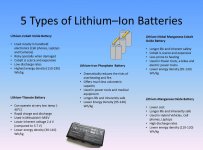porthole
Retired
I'll start, maybe we can make a subject specific daughterboard?
The latest and greatest for those considering boon docking more, living off grid or just interested in more technology then what is a standard with our RV's
Battle Born (a brand) of lithium iron phosphate battery technology AKA LiFePO4, is quite popular by those living off grid or boon docking.
There is a lot of talk about positives and negatives (see where I went there)
For 12 volt DC storage, they are significantly lighter, charge much faster, have a lower self discharge, and can be discharged to 80% or more state of charge (SoC) or depth of discharge (DoC)
The only real negative is price, about 3-4 times more expensive then lead acid types.
But the cost can be offset by longevity, 10-15 years is the claim for properly maintained systems. To save you the trouble of looking it up, Battle Born LiFePO4 batteries are $950 each for a 12 volt, 100AH battery.
5 basic types of lithium battery composition.

Some posts of several battery safety websites.
"intrinsically non-combustible"
"In conclusion, don’t ever overcharge lithium cells and never, ever take them into over-discharge territory. A cell which has suffered a complete voltage collapse or polarity inversion is only good to be discarded immediately, even though it could appear that it can be somewhat recharged. Don’t try, don’t risk it".
"Phosphate based technology possesses superior thermal and chemical stability which provides better safety characteristics than those of Lithium-ion technology made with other cathode materials. Lithium phosphate cells are incombustible in the event of mishandling during charge or discharge, they are more stable under overcharge or short circuit conditions and they can withstand high temperatures without decomposing. When abuse does occur, the phosphate based cathode material will not burn and is not prone to thermal runaway. Phosphate chemistry also offers a longer cycle life."
"The lithium-iron (LiFePo4) battery has a slight edge over the Li-ion (LiCoO2) battery for safety. This is important because a battery should not get overheated or catch fire in case of overcharging.
The lithium-iron battery has superior chemical and thermal stability. A Lithium-iron battery remains cool at room temperature while the Li-ion may suffer thermal runaway and heats up faster under similar charging conditions".
"LiFePO4 is a nontoxic material, but LiCoO2 is hazardous in nature, so is not considered a safe material. Disposal of Li-ion battery is a big concern for the manufacturer and user."
The latest and greatest for those considering boon docking more, living off grid or just interested in more technology then what is a standard with our RV's
Battle Born (a brand) of lithium iron phosphate battery technology AKA LiFePO4, is quite popular by those living off grid or boon docking.
There is a lot of talk about positives and negatives (see where I went there)
For 12 volt DC storage, they are significantly lighter, charge much faster, have a lower self discharge, and can be discharged to 80% or more state of charge (SoC) or depth of discharge (DoC)
The only real negative is price, about 3-4 times more expensive then lead acid types.
But the cost can be offset by longevity, 10-15 years is the claim for properly maintained systems. To save you the trouble of looking it up, Battle Born LiFePO4 batteries are $950 each for a 12 volt, 100AH battery.
5 basic types of lithium battery composition.

Some posts of several battery safety websites.
"intrinsically non-combustible"
"In conclusion, don’t ever overcharge lithium cells and never, ever take them into over-discharge territory. A cell which has suffered a complete voltage collapse or polarity inversion is only good to be discarded immediately, even though it could appear that it can be somewhat recharged. Don’t try, don’t risk it".
"Phosphate based technology possesses superior thermal and chemical stability which provides better safety characteristics than those of Lithium-ion technology made with other cathode materials. Lithium phosphate cells are incombustible in the event of mishandling during charge or discharge, they are more stable under overcharge or short circuit conditions and they can withstand high temperatures without decomposing. When abuse does occur, the phosphate based cathode material will not burn and is not prone to thermal runaway. Phosphate chemistry also offers a longer cycle life."
"The lithium-iron (LiFePo4) battery has a slight edge over the Li-ion (LiCoO2) battery for safety. This is important because a battery should not get overheated or catch fire in case of overcharging.
The lithium-iron battery has superior chemical and thermal stability. A Lithium-iron battery remains cool at room temperature while the Li-ion may suffer thermal runaway and heats up faster under similar charging conditions".
"LiFePO4 is a nontoxic material, but LiCoO2 is hazardous in nature, so is not considered a safe material. Disposal of Li-ion battery is a big concern for the manufacturer and user."


